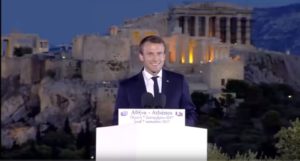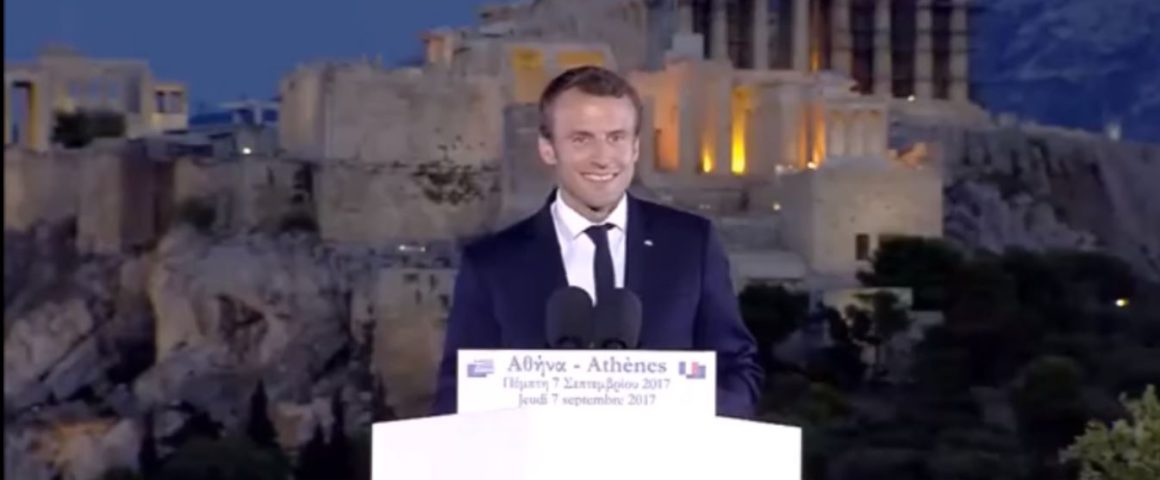Tijdens een bezoek aan Athene, gaf de Franse president Macron een toespraak waarin hij sprak over het belang van de Klassieke Oudheid voor het moderne Europa. Macron gaf zijn speech vorige maand vanaf de Pnyx met op de achtergrond de Acropolis. En hij begon zijn speech zelfs in het Grieks. Over de Acropolis zei hij dat het als een spiegel onze Europese identiteit reflecteert, waarin we onszelf en onze gezamenlijke toekomst kunnen zien.
Hieronder lees je de passages uit de speech van Macron over de Klassieken. De volledige speech in het Frans en in het Engels is te vinden via deze link.
De video van Macrons volledige speech, inclusief zijn opening in het Grieks, is te bekijken via deze link.

I cannot, however, limit myself to the emotion of these historical
sites, no matter how strong. Rather, I wish to hear what they have to
say. Because these places demand that we listen to them, because it was
here that the modern State was created, here that the city of Athens was
built patiently by the sovereignty of the people, the sovereignty of
their destiny, we must ask ourselves without complacency “what have we
Europeans done with our sovereignty?”
Because it was here that the risk of democracy was taken, the risk that
puts the government of the people into the hands of the people in the
belief that respectable law is better decided by as many as possible and
not as few, we should ask ourselves: what have we done with our democracy?
And the words that, not far from here, Pericles spoke in honour of
warriors who died in war, let us listen to them and reflect even more
deeply. “Freedom”, he said, “is our rule for governing the Republic, and
our daily relationships. Suspicion has no place.” But we Europeans, do
we still have trust in ourselves?
On the Pnyx, it was free speech, debate and even controversy that
prevailed. Therefore, I would like to be frank with you this evening and
speak plainly: in Europe today, sovereignty, democracy and trust are in
danger. …
As Europeans, we share a history and a destiny. We can rebuild
confidence because we will rediscover this path. Look where we are
standing: even now, during the night, you can see the hill behind me:
the Acropolis. Whoever you are, whatever your age, your nationality and
your origin, does the miracle of this hill, the columns of the
Parthenon, the silhouette of the Erechtheion and its caryatids not
awaken in you the feeling that something was born here that concerns
you, that belongs to you, that speaks to you?
Yes the Acropolis of Athens is a mirror reflecting our European
identity, we recognize ourselves, we read our common destiny in this
mirror and this temple was that of the gods from antiquity, but today
the beliefs that created it have vanished and yet we still have this
force in our minds. We can still feel its sacred element.
As André Malraux said, some nearly sixty years ago in this very place,
there is a hidden Greece that is lying in the hearts of all men and
women of the Western world. This hidden Greece is what we do not grasp,
which means that even if we allow ourselves to get caught up in our
trivial European debates and these civil wars that I mentioned earlier,
we can be a few thousand miles away and still recognize a European, an
image that reminds us of Europe, a feeling that unites us, a smell, a
colour, something we read, that makes us feel European again.




 Deze website is onderdeel van de Vereniging Classici Nederland en gerealiseerd door AdCon Online Marketing.
Deze website is onderdeel van de Vereniging Classici Nederland en gerealiseerd door AdCon Online Marketing.
'Franse president Macron spreekt over belang van de Klassieken' has no comments
Geef als eerste commentaar hierop!